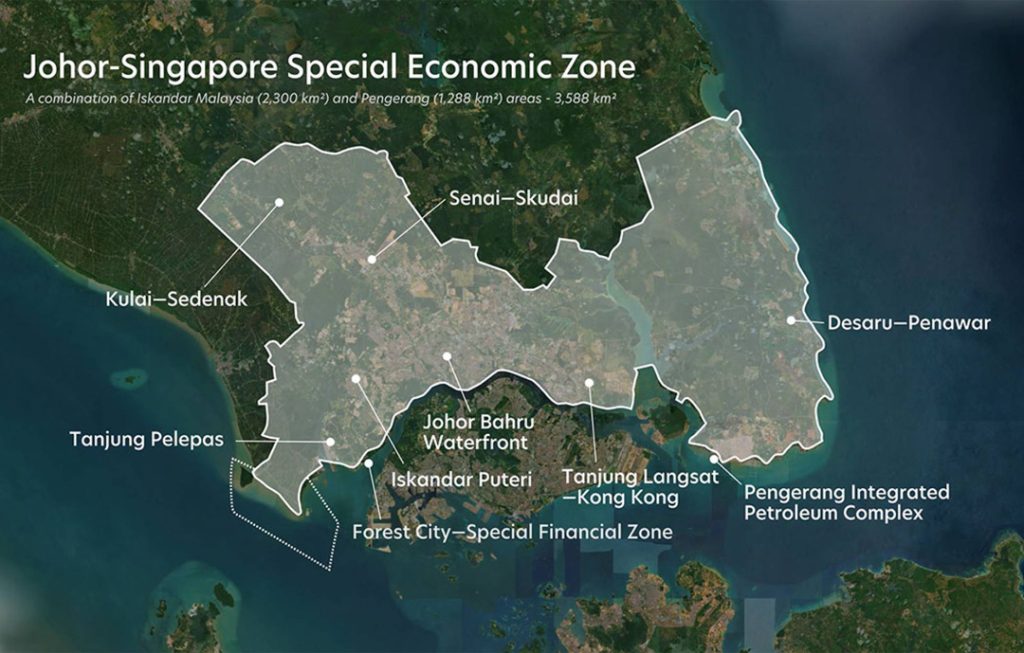The Johor-Singapore Special Economic Zone (JS-SEZ) is emerging as a cornerstone of Johor’s transformation into a next-generation regional powerhouse, with the state offering a compelling value proposition to global investors in artificial intelligence (AI), data centres and high-value industries.
Johor Investment, Trade, Consumer Affairs and Human Resources Committee chairman Lee Ting Han said the JS-SEZ – developed in close collaboration with Malaysia’s federal government and Singaporean counterparts – aims to harmonise cross-border regulations, unlock trade flows and ease talent mobility between the two countries.
“This zone will make the state even more competitive and connected,” he said, emphasising that Johor is not a passive recipient of federal or foreign policy, but an active agent shaping regional growth through coherent, long-term strategies rooted in clarity, consistency and capacity.
At the heart of this transformation is Medini, a flagship smart city that Lee described as a ‘public-private innovation lab’, attracting more than RM13 billion in cumulative investments to date in sectors such as healthcare, education, business services and smart infrastructure.
“Medini is more than just a real estate – it’s a collaborative innovation platform. Now is the time to shift from dialogue to action through memoranda of understanding (MoUs), pilot projects and enduring partnerships,” he stated.
Lee then urged policymakers and institutions to recognise that sustainable, digital nation-building depends on integrated action across technology, energy, environmental, social and governance (ESG) frameworks.
“What we’ve built today reflects on the need for cross-sector coherence. Let us now move from consensus to execution,” he added, noting that Johor is undergoing a fundamental shift from a traditional industrial base into a next-generation economic powerhouse, driven by policy innovation, infrastructure readiness and investor confidence.
The JS-SEZ is already drawing increased interest from international investors such as Japan, South Korea, China and Europe.
On this, Iskandar Regional Development Authority (RIDA) chief executive Datuk Mohd Noorazam Osman said that recent investment enquiries received by the Invest Malaysia Facilitation Centre Johor reflect strong interest from these key markets, underscoring Johor’s emergence as a promising regional growth hub.
“This is a positive outlook not only for Johor, but also for Malaysia as a whole. Amid ongoing global volatility, investors are looking to ASEAN as a promising entry point into new regional markets,” he stated.
On key investment sectors, Noorazam mentioned that Japanese investors are particularly drawn to electrical and electronics (E&E), financial services, technology and the digital economy.
“We have also received enquiries from Japanese banks acting on behalf of their clients. We are facilitating engagements, particularly with institutions such as Mizuho Bank and Sumitomo Mitsui Banking Corporation, with whom the Economy Ministry recently signed a letter of intent (LOI),” he added.
Meanwhile, Iskandar Investment Bhd (IIB) president and chief executive officer Datuk Idzham Mohd Hashim said Medini is fully equipped to welcome new investors, supported by comprehensive infrastructure and a business-friendly ecosystem.
He said the ‘plug-and-play’ development model implemented in Medini enables investors to begin operations immediately.
“The land is ready and essential utilities – including electricity, water, fibre optics and cabling – are already in place. Instead of starting from scratch, investors can establish operations in Medini, which already hosts nearly 40 international companies. These businesses are thriving and it’s now a matter of scaling up,” he commented.
When it comes to global uncertainties and Singapore’s recent downward revision of its gross domestic product (GDP) forecast to 0.2%, he acknowledged that some investors are adopting a wait-and-see approach due to geopolitical tensions.
“There may be short-term corrections, such as what Singapore is experiencing, but we believe these are temporary.
ASEAN remains one of the world’s fastest-growing regions, with a youthful and expanding middle class. Young people account for about 50%-60% of Southeast Asia’s 650 million population,” he noted.
According to Idzham, the natural geographic advantages of Johor and Singapore as investment destinations are further bolstered by political stability and the absence of natural disasters.
With that in mind, he revealed that IIB’s development strategy will focus on physical infrastructure and also soft infrastructure.
“Soft infrastructure includes talent development, facilitation by government agencies and enabling businesses to access markets. That’s the ecosystem we’re building. Not just buildings and road, but the support systems businesses need to thrive,” he explained.


